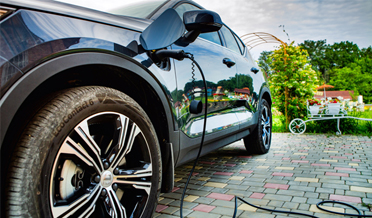Home Electric Vehicle Charging Solutions
Electric Vehicle Charging Solutions For Your Home
Are you considering a new electric vehicle?
Recently, I parked in a local State Park to hike and noticed the sporting look of a car I didn’t recognize. It was a Tesla and it surprised me to see an electric vehicle in a rather rural setting.
The Rise of Electric Vehicles
However, electric vehicles (EV) sales are rising worldwide and now in the U.S. In 2010, just 17,000 electric vehicles were in use worldwide. The technology improved and by 2019, 7.2 million EVs were on the road, 1.4 million in the U.S. Several changes are driving the innovation:
- Technology is improving all the time. The average distance an EV manufactured in 2010 could travel was 84 miles per charge. The 2020 models boast between 200 and 300 miles per charge. It is estimated that by 2028 electric vehicles will average 400 miles per charge, the equivalent of the miles driven by the average sedan on a tank of gas.
- Government incentives (carrots) and regulations (sticks) are in place with car manufactures. The goal is to reduce our carbon footprint, reduce our dependence on fossil fuels, and improve air quality. Some states are quicker to accept the change. California and 11 other states have agreed to ban new internal combustion vehicles by 2035.Like them or not, you can expect to see more EV options and fewer gas-powered vehicles in the future.
- With all of the research and incentives, the cost of EVs is falling each year. The most expensive component for EVs is the batteries. Smaller, lighter, more powerful batteries result in better utility and make EVs more affordable.The cost to manufacture a battery per kilowatt-hour has fallen from $1,183/kWh in 2010 to $135/kWh in 2020.By 2030, researchers estimate kWh cost to be as low as $65/kWh. By 2025, the cost of electric-powered vehicles is estimated to be on par with internal combustion engine vehicles.2
Electric Vehicle Charging Infrastructure
Buying the first EV must have been like buying the first fax machine. We have a nationwide infrastructure for acquiring gasoline and diesel fuel, but where can you find a charging station?
The greatest barrier to widespread acceptance of EVs is the question facing potential EV purchasers is “Where can I charge it?” If the national goal is to increase EV use, consumers must be convinced adequate options are available to overcome “range anxiety.”
- As the sales of EVs increase, even more, charging options must be available. Multiple charging options will need to be in place, so if you “run out of juice,” you are not stranded.
- The Federal Government is also incentivizing the development of EV charging station infrastructure. Many charging options will be commercial ventures, just like the gas station, convenience store, or truck stop.
- Just like battery prices, expect the initial charges to be reasonable, but come down over time. There will be trends that develop but imagine if you could charge your care at the office will you are working or the shopping centers or grocery stores will you shop. Perhaps “range anxiety” will be no more valid with an electric car than a gas-powered car.
- The demand for charging energy in 2020 was about 20 billion kWh; it is expected to grow to about 280 billion kWh in 2030. The goal is to add 400,000 public charging stations in the coming years, bringing the total to 500,000.
Electric Vehicle Charging Options
With present technology, there are three types of charging stations for EVs, and chances are you may use more than one option.
Level 1 Electric Vehicle Charging
Every EV is sold with a Level 1 charger and no installation is required. Your Level 1 charge plugs into any standard 120v wall outlet. The pro for this option—you can charge your EV from almost any location at no extra cost. The con for this option—it is very slow. Charge time for a 100-mile charge might be 10-17 hours.
Most likely, this will not be your main option. However, it is like the “donut” spare tire; it will sure help in an emergency.
Level 2 Electric Vehicle Charging
A Level 2 charger will probably be a preferred option since it cuts the charge time for a 100-mile charge to 4-t hours and a full charge to 6-9 hours. Level 2 chargers use 240v outlets, similar to your clothes dryer or HVAC system. A Level 2, installed in your garage, would allow you to leave the next morning fully charged with confidence.
However, installing a Level 2 charging station in your garage is not a DIY project, unless you are a professional electrician. An electrician will need to analyze your power service to ensure you have sufficient reserve to power a charger as needed.
The electrician will install a new breaker, run power to the station site, install the charger and demonstrate its safe use. Having a professional install the charging station will ensure it is completed according to the building code and avoid hazards. Expect the installation to cost between $200 and $1,200, depending upon how complicated the install.
Level 3 Electric Vehicle Charging
Level 3 or DC Fast Chargers are used for public charging stations and for commercial/industrial settings. The pro—they are extremely fast (in comparison), with a charge time for a 100-mile charge at about 20 minutes, a full charge in about 30 minutes. The con—it is prohibitively expensive for home use.
Expect to use a Level 3 charger with a user fee. How much? It varies, and it will fluctuate as they become more available. Public charging stations will be the equivalent of current gas stations.
Have questions about Home Electric Vehicle Charging?
For more information about R.M. Mullinix and Home Electric Vehicle Charging, schedule an appointment, or visit our Home Electric Vehicle Charging information page.

1 https://www.cnet.com/roadshow/news/california-gas-diesel-car-truck-sales-ban-2035- newsom/
